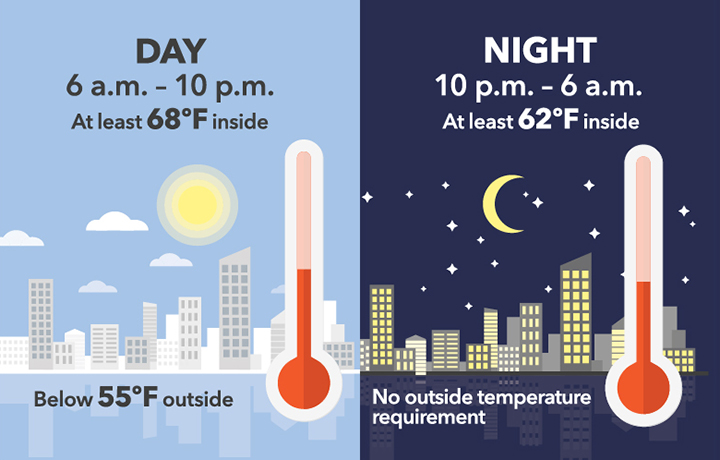Heat and Hot Water HPD NYC
Heat and Hot Water
Building owners are legally required to provide heat and hot water to their tenants. Hot water must be provided 365 days per year at a constant minimum temperature of 120 degrees Fahrenheit. Heat must be provided between October 1st and May 31st, i.e. "Heat Season," under the following conditions:
Day
Between the hours of 6:00am and 10:00pm, if the outside temperature falls below 55 degrees, the inside temperature is required to be at least 68 degrees Fahrenheit.
Night
Between the hours of 10:00pm and 6:00am, the inside temperature is required to be at least 62 degrees Fahrenheit.

If a tenant files a 311 complaint related to heat or hot water, HPD attempts to notify the building owner or managing agent and may also attempt to contact the tenant to see whether service has been restored. If service has not been restored, an HPD inspector will go to the building to verify the complaint and issue the appropriate violation.
If an owner fails to restore heat and hot water after receiving a violation, HPD's Emergency Repair Program (ERP) may contract with private companies to restore essential services and bill the owner for the cost of the repairs, plus related fees. The City is subject to laws governing procurement, contracting, and wages that may make such work significantly more expensive than the price the owner could obtain themselves. If the property owner fails to pay, the City will file a tax lien against the property. The tax lien will bear interest and may be sold and/or foreclosed to collect the amount owed through the City's Tax Lien Sale.
Civil Penalties
HPD typically starts a court proceeding for all issued heat violations and some hot water violations. The agency can seek the following penalties, effective on the posting date of the Notice of Violation until the date that the violation is corrected:
- $250-$500 dollars per day for each initial heat or hot water violation
- $500-$1,000 per day for each subsequent violation at the same building during the same and/or the next calendar year from the initial violation or, during the same and/or the next heat season
If the owner fails to pay the Court ordered civil penalties, HPD will enter a judgment against the owner and the property and seek to enforce that judgment.
Eligibility for payment in satisfaction of civil penalties
Some owners may be eligible to satisfy the penalty by submitting a $250 payment with a timely Notice of Correction. The Notice of Violation will clearly indicate whether the violation is eligible for payment in satisfaction of civil penalties, based on whether the heat violation is the first such violation of the current or prior heat season, or the hot water violation is the first such violation of the current or previous calendar year. An owner who chooses to submit a Notice of Correction and payment in satisfaction may do so by mail or by using eCertification. The condition must be fixed within 24 hours of the violation posting (the same as the inspection date), and the $250 payment must be made within 10 days. Payment can be made via credit card or debit card (there is a 2% convenience fee for credit cards), or by certified check or money order. If the Notice of Correction and payment are not received within the 10 day period, HPD may pursue an order to correct and civil penalties in Housing Court.
Inspection Fee
HPD will charge a $200 fee for all inspections after the first two, if they result in a heat violation within the same heat season (October through May) or a hot water violation within a calendar year. This fee is in addition to any civil penalties that may be imposed by the Housing Court. This fee is not paid directly to HPD, but will be billed to the owner though the Department of Finance on the quarterly bill following the inspection. All unpaid fees become a debt owed by the owner and a lien upon the premises. The tax lien will bear interest and may be sold and/or foreclosed to collect the amount owed through the City’s Tax Lien Sale.
